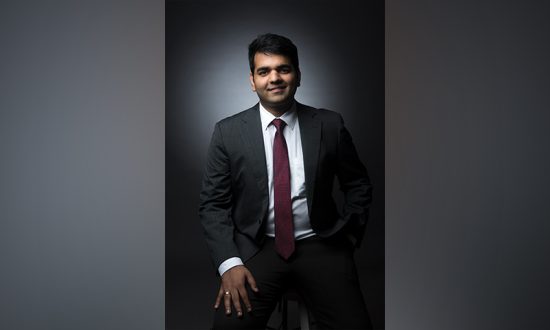Rajesh Kabra, a youth leader & a dynamic entrepreneur is a Director at RR Global, an 850+ Million USD diversified group of industries focusing mainly on infrastructure & electrical solutions spread across 85 countries globally. Mr. Kabra is best known for spearheading RR Parkon, India’s largest automated multilevel car parking solutions company. He started his career at a young age with Tyco as a Business Analyst and later moved to BG Group where he was responsible for Strategic Planning. Rajesh joined RR Global in early 2009 when he was only 21 years of age where he took on the responsibility with his team to lead the business at RR Parkon and turned it into a successful venture for the group company.
The availability of sufficient parking spaces has always been a challenge in our country. In addition to this, the growing population, increasing car purchases, poor maintenance and the lack of technology have been adding to these concerns. The parking sector is unorganized however, there is a significant focus on the development of smart cities that include a robust road- infrastructure and this trend have been gaining traction globally. This mission also encourages integrating Information Communications Technology (ICT) solutions within parking systems which can improve the overall efficiency of the real estate project and thereby enhance the quality of life for citizens.
The constant concerns when it comes to urban mobility have made development even more difficult. While sustainable mobility is a focus, there is a demand for parking spaces, especially in places that have limited capacity to ensure seamless transport within the city. Also, since cars are stationary most of the day, and efficient parking space that reduces the city’s congestion has been the focus. Transport companies are mandated to improve the quality of services to enable smart urban mobility. Over the last few years, smart parking and automated parking solutions have proven to be a boon to the sector in their effort to combat these challenges. Smart parking empowers traditional parking systems by digitizing spaces as well as optimizing space usage and reducing inefficiencies. These solutions combine smart technology along with human efforts to help increase the efficiency of parking spaces.
Automated parking solutions make use of the Internet of Things (IoT) and data to enable and create a better and digitized parking experience for consumers. Various components that change the dynamics of this consumer experience include the use of IoT and data that come together, the use of sensors, automatic gates, and so on and so forth.
Evolving Indian Parking Ecosystem
According to a report by Fortune Business Insights, the global IoT market size was USD 308.97 billion in 2020. The IoT market is further projected to grow from USD 381.30 billion in 2021 to USD 1,854.76 billion in 2028 at a CAGR of 25.4% in the 2021-2028 period. The use of IoT and data have been gradually adopted into parking solutions in India and is sure to increase over time as well. IoT offers a unique opportunity that allows parking businesses and city governments to convert data collected into smart insights for customers. Smart parking solutions and automated systems are imperative for the development of Indian cities since no other technology has the potential or capability to communicate in real-time. Ultimately, smart parking is the only smart way- forward for Indian cities that can revolutionize the parking ecosystem into green, safe and efficient spaces.
The use of IoT and Data in smart automated parking
IoT is boosting the pace of using newly improved and innovative technologies in the transport industry, especially in its role through the integration into smart parking and automated parking solutions. Today, leveraging these solutions have proven beneficial as adopting this technology in car parking has equipped customers with connected systems allowing drivers to view and use it at ease on their smartphones. IoT has allowed one to set directions using roadside assistance, enable remote open and closing of vehicle doors as well as locate free parking spaces. Today, with evolving technology, fully functional IoTs such as intelligent parking systems can collect a massive amount of data that are focused on all aspects of data flow including collection, visualization, processing and storage.
Increasing the opportunities for sustainability
According to a report by Markets and Markets, the automated parking system market is projected to grow at a CAGR of 13.1% from 2019 to 2027 to reach a market size of USD 3.6 billion by 2027. The report states one of the key drivers for this growth is green and sustainable parking solutions. The use of automated parking solutions plays a key role in creating green spaces in the city by enabling green spaces to improve the air quality and a healthy environment for all. Additionally, automated parking facilities can help reduce the usage of electrical service requirements for EV chargers since vehicles within an automated parking system can be moved to and from charging positions when they need to be charged instead of having chargers or supply equipment in every EV parking space.
Automated parking facilities eliminate the need to drive around in circles endlessly in search of a parking space. With this feature, drivers save time and contribute to reducing emissions as well. Since transportation is the contributor to at least a fifth of all global emissions, any technology that helps the driver get to his/her destination faster is ultimately a better sustainable option for drivers or customers.
The growing IoT and data market has a huge potential to improve the automated parking systems in India. This kind of impetus laid on the use of automated parking solutions will, in turn, help drive urban mobility thereby minimizing traffic congestion in cities, encouraging a convenient parking infrastructure and reducing the overall carbon footprint of the country. As the world of technology continues to evolve, the parking automation market will evolve and it is time the countries across the globe jump onto this bandwagon to create a better future for all.


